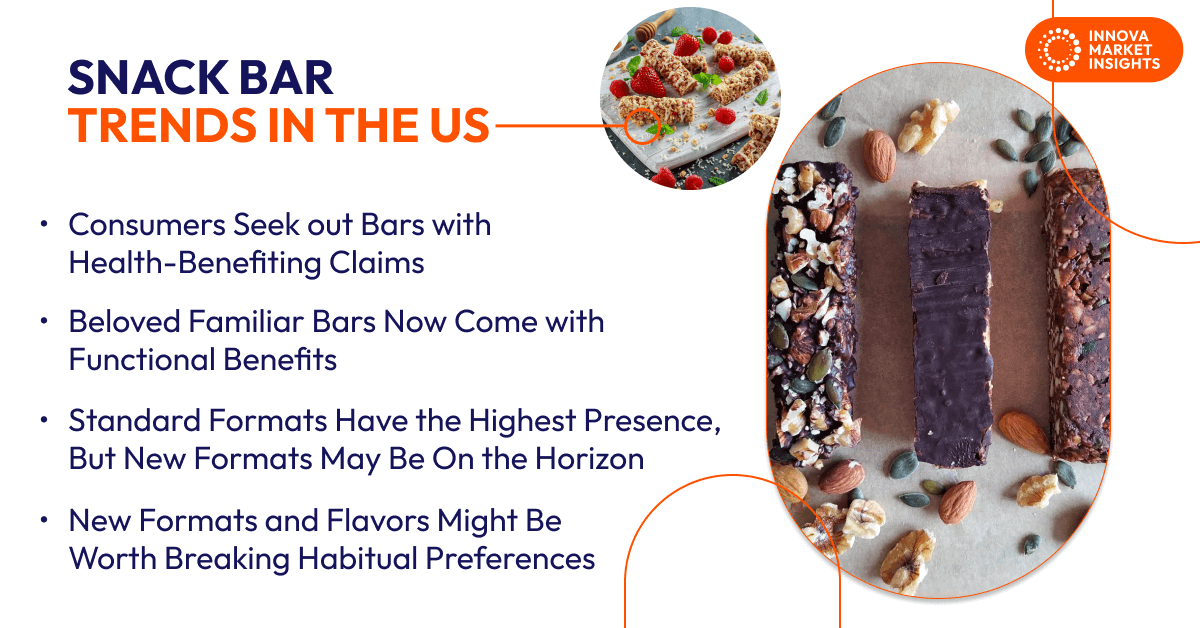Snack bars have long been one of America’s most trusted and valued convenience foods. The American snack bars segment has always been fast-moving, and we continue to see changes in ingredients, formats, flavors, claims, and new snack bar trends.
Consumer Snack Bar Perceptions
Consumer insights reveal numerous snack bar trends. Snack bars are tied for fifth in terms of purchase penetration among nine other snack-related categories in the United States. While purchase penetration is highest among boomers, frequency of consumption is higher among younger consumers and those with children.
Snack bars are consumed most frequently in the first half of the day, with most bars eaten at breakfast or as a morning or afternoon snack. The top reasons for eating snack bars are taste, convenience and “to fill me up”. Snack bar purchases by U.S. consumers are most influenced by health or other claims that meet consumer needs, including fiber, protein, real ingredients, and no, low or reduced sugar claims. The most popular American snack bar trends regarding flavor in the U.S. snack bar category are all brown flavors, ranking first through fourth. The leading snack bar flavor is peanut butter, followed by milk chocolate, dark chocolate and caramel.
Snack Bar Market Landscape
The snack bar market is highly fragmented, with the top 10 companies representing the U.S. snack bar market accounting for only 26% of U.S. branded product launches between 2018 and 2023 YTD. However, General Mills and Kellogg are the category leaders for new snack bar products, accounting for 7% and 4% of US snack bar launches during this five-year period. In addition to branded category activity, private label snack bar products accounted for 12% of new snack bar products in the U.S. during the same five-year period, with an increase between 2018-2020 and 2021-2023 YTD.

US Snack Bar Leaderboard
Despite the stronger annual growth than cereals, new product development (NPD) growth was slightly weaker for snack bars than for total cereals, with compound annual growth rates (CAGR) percentages of -8 % and -6%, respectively. Most new snack bars possess various qualities regarding their main characteristics, size, and texture. 23% of launches are protein-focused, taking up the largest percentage of new bar types, with granola bars coming in second at 14%. In terms of format innovation, the standard bar shape is still the most popular with 83% of new product launches in this shape, followed by bites with 11%.
There is limited innovation in texture consistent with the fact that consumers have a preferred texture palette. Chewy, crunchy, and crispy textures are the top four textures in the American snack bar NPD.
The top snack bar ingredients used in the US snack bar segment include oats, almonds, peanuts and coconut. Snack bars may prove that reliability can also be versatile, with functional ingredients now accounting for two-fifths of launches, and a +8% increase in the percentage of launches (2021-2022 vs. 2018-2019).
The most popular US snack bar NPD flavors are milk chocolate, peanut butter, and almond. The top claims among new snack bar products were gluten-free, GMO-free, fiber-related, and vegan.
US Snack Bar Trends Impact
Innova’s Top Ten Trends can be seen in the snack bar trends category. Healthier living and Unpuzzling Health – a trend highlighting the growing importance of communication and certification to reinforce consumers’ ongoing health strategies – are key for the US snack bar market as new products often promote gluten-free, fiber, protein, and other nutritional benefits.
The plant-based trend is also evident in the American snack bar market; grains, rice, nuts, and fruits are key ingredients. Vegan and vegetarian claims are more common than explicit plant-based messages. Claims and messages supporting simple pleasures in everyday life are a relevant trend for brands with quality and indulgence branding. These simple pleasures also encourage sharing their products with family and friends. Related to Innova’s 2023 Generational Push trend, snack bars show above-average consumption frequency among younger consumers and consumers with children.
What’s Next?
While traditional product types, forms, and textures will likely continue to dominate new snack bar trends and products in the US market, expect growth in non-traditional products, especially new product forms. Likewise, while traditionally strong flavors, like brown flavors, will continue to lead, expect to see more innovative snack bar flavors to address consumers’ increased desire for more variety and indulgence. Expect the introduction of more complex flavor combinations, especially from small companies looking to stand out. Alongside the introduction of less common ingredients and the increase in consumer interest in functional ingredients, look for the addition of ingredients such as prebiotics, probiotics, or CBD and hemp to the traditional fiber, protein, and sugar-reduction trend.
Positioning claims and communication of targeted health benefits are likely to increase. Expect to see more frequent plant-based claims.
This article is based on our report, “Stay Ahead of the Curve: The Future of Snack Bars in the US.”
If you are interested in receiving this report, feel free to request a demo through our Contact Form.